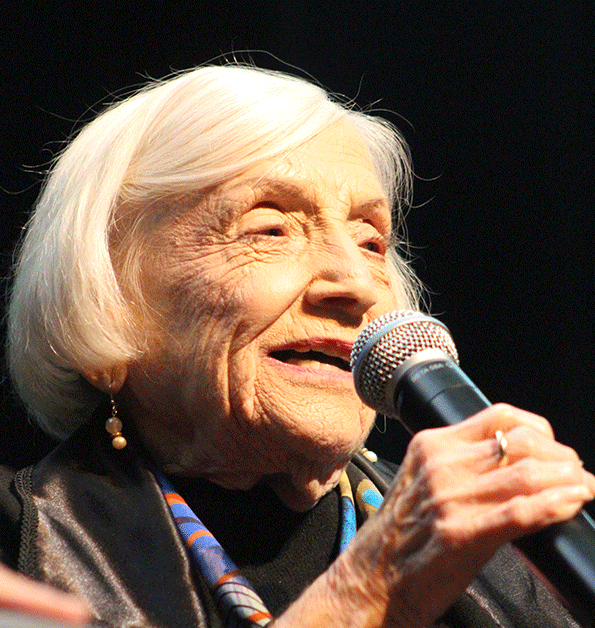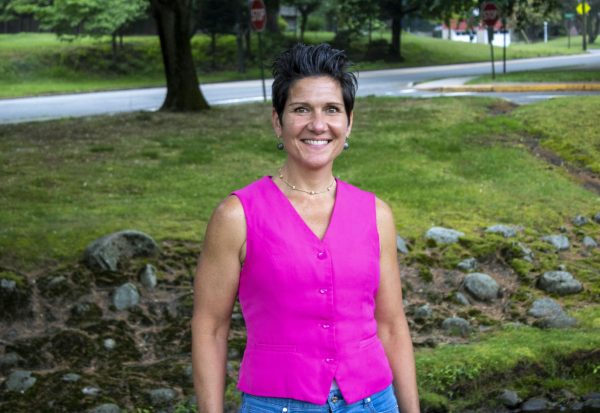“Unlikely spy” visits Pascack Valley
Frenchwoman helped gather info on Germans in World War II
Marthe Cohn, who spied on the Nazis during World War II, spoke at Pascack Valley on Monday night.
In the evening of Oct. 19, the Pascack Valley auditorium nearly hit its maximum capacity as people of all ages filed in to hear World War II hero Marthe Cohn speak. Over 850 people sat and listened to the story of the former French spy, who gathered intelligence from the Germans and relayed it back to France.
Jillian Fein, a senior at PV, began the night by introducing Rabbi Yosef Orenstein, Teen Leadership Initiative director at the Valley Chabad and and the director of “Eternal Flame.” The organization brings holocaust awareness to the younger generation.
“It’s more than just about studying about what happened,” Orenstein said. “It’s about having survivors share their stories and seeing how we, as young people, can not just hear their stories, but make the world a better place.”
Rabbi Yosef Orenstein reached out to Cohn as part of “Eternal Flame.”
After the controversy last May, Orenstein had been in contact with Erik Gundersen, the Superintendent of Schools in the Pascack Valley Regional High School district. Upon hearing about Cohn’s visit, Gundersen volunteered to host the event in the PV auditorium.
“I was a very unlikely spy,” Cohn said at the beginning of her presentation.
Cohn was born into an orthodox Jewish home in Metz, France. She was 19 years old when the war began. Cohn had many brothers, several of whom were in the French army at one point. She and her sister helped other escape to unoccupied France.
It was June 17, 1942 when Cohn’s sister, Stephanie, was arrested by the SiPo, which was comprised of members of the gestapo and the Kripo.
Before her sister’s arrest, Cohn had been stopped by a man named Mr. Charpentier. He told her that he could give her falsified identity papers. With these falsified papers, Cohn devised a plan to break her sister out of prison. When she finally figured it out, her sister refused.
“Don’t you realize,” Cohn recalled her sister saying, “that if I escape, you will all be arrested?”
Shortly afterwards, her sister was deported to Auschwitz and killed. Her father’s and brother’s arrests followed.
After escaping occupied France into Paris, Cohn enlisted in the army as a nurse. While working as a nurse, it was discovered that Cohn could speak both German and French and was asked to become an intelligence officer. She agreed.
“And then,” Cohn said, “I sat down in a chair and wondered in what predicament I’d gotten myself into.”
After 14 failed attempts, Cohn finally managed to infiltrate Germany through Switzerland, a neutral country during the war. She pretended to be a German nurse in a desperate search for her missing fiance.
“I had no papers,” Cohn said. “I had nothing to prove who I was.”
As a nurse, she gained the trust of German military members quickly and began to report back on the movements of German military forces. Cohn was constantly terrified that she would be discovered.
During her time as a spy, she relayed two major pieces of intel. It was thanks to her that the Allies learned the location of German Army members who awaited the allies in the Black Forest. Her bravery also led to the Allies breaking through the Siegfried Line and into German territory in 1945.
“It’s great for us to study history in our coursework,” Gundersen said at the end of the night. “But to hear a personal connection, in this case through someone who really was a hero, to hear the personal story makes history come alive for students and adults alike.”
“Be engaged and never accept an order which is against your conscience,” Cohn said. “These are my two messages.”







